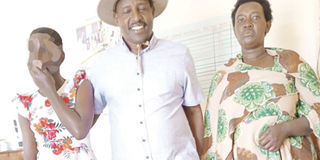Prime
Forced early marriages: When culture, law clash

The Kyotera Resident District Commissioner, Mr Apollo Baguma (centre), the victim from the viral video on social media (left), and her mother on August 6. PHOTO / COURTESY
What you need to know:
- About 10 people were seen at the scene when the girl was taken, including a woman who was on the motorcycle with the victim, but all of them did nothing and just watched as the drama unfolded.
On August 6, a video showing six men emerging from a car, grabbing a girl off a motorcycle and forcing her into a waiting car as she screamed for help went viral on social media.
The 14-year-old girl was later identified as a Senior Two student at a secondary school in Kyotera District.
About 10 people were seen at the scene when the girl was taken, including a woman who was on the motorcycle with the victim, but all of them did nothing and just watched as the drama unfolded.
Police investigations revealed that the woman was the girl’s aunt who had decided to forcibly marry her off without the consent of her parents.
Days later, police found the victim in a room in Kyotera District where she had been abandoned by the suspects, who are still on the run.
Among the Bahima and Banyarwanda (Tutsi) ethnic tribes in the districts of Rakai and Kyotera, bride kidnapping is still carried out despite the law, which discourages child marriage.
Mr Abel Nkotani, 60, a resident of Akanara A Cell in Lwembajjo Ward in Dyango Town Council, Rakai District, said bride kidnapping is locally referred to as okukiriza.
“It is very difficult to tame this tradition because once the bride is kidnapped; it increases the bargaining power of the girl’s parents to get more cows for bride price,” he said.
He further said the families of the kidnapped brides are given up to 16 or 20 heads of cattle and Shs6 million as bride price which, to many of the parents, is a good enough reason to let their child get married at a young age.
How bride kidnapping works
Men book girls when they are still very young (five years and above). By the time the girl clocks 16, all the bride price would have been paid and the girl is taken away (kidnapped) for marriage.
For a booking, the father of the girl can be paid around two or four cows to look after the girl and protect her from other men who may want to marry her.
Mr Allan Musasire, an advocate and youth leader at Rakai District, said Article 31 of the Constitution guarantees the right to form a family through marriage and this is only a preserve of the persons above the age of 18 years.
“And this must be with full consent of both the man and woman intending to get married. Article 33 of the same supreme law prohibits any cultural norms, customs and practices that are against the dignity of women. So, our communities just need to abide by the law and shun such outdated cultural practices,” he said.
Ms Cynthia Rukundo, the head of public and corporate relations at Babies and Mothers Alive (BAMA), an organisation caring for needy children and young mothers, said: “It is very hard to follow up a case of marriage by abduction or bride kidnapping because the parents on both sides find no problem in the practice as they treasure it to be part of their culture. They can hardly pin the perpetrator because they want to keep the tradition.”
Mr Ignatius Ally Nuwoha, the executive director of the African Network for the Prevention and Protection against Child Abuse and Neglect (ANPPCAN), said the government needs to sensitise the communities about the dangers of forced marriages.
“Government should empower the different institutions and communities in handling such matters. As long as the practice denies a child the right to attend school and takes away her freedom, the law must take its course and the perpetrators arrested,” he said.
He added: “If schools are constructed in different areas, the girls will have a chance to study and once they are kept in school, there will be limited chances of forcing them into early marriages.”
child marriages
According to United Nations Children’s Fund (Unicef), Uganda has the 16th highest prevalence rate of child marriages in the world and the 10th highest absolute number of child brides globally. In Uganda, 10 percent of girls are married before 15 years and 40 percent are married by the age of 18.
According to Section 129 of the Penal Code (Amendment) Act, 2007, any person who performs a sexual act with another person who is below the age of 18 years, commits a felony known as defilement and is on conviction liable to life imprisonment.
Any person who attempts to perform a sexual act with another person who is below the age of 18 years commits an offence and is on conviction, liable to imprisonment not exceeding 18 years.
Compiled by Al-Mahdi Ssenkabirwa, Ambrose Musasizi & Wilson Kutamba




